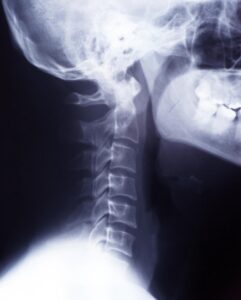 Your first thought when you hear the word whiplash, is probably car accident. In fact, whiplash is a common neck injury that occurs after a rear-end auto accident. Whiplash can also be referred to as a neck sprain or neck strain, and is a type of neck injury that occurs due to forceful and rapid movement of the neck forward and backward.
Your first thought when you hear the word whiplash, is probably car accident. In fact, whiplash is a common neck injury that occurs after a rear-end auto accident. Whiplash can also be referred to as a neck sprain or neck strain, and is a type of neck injury that occurs due to forceful and rapid movement of the neck forward and backward.
Symptoms of Whiplash
Whiplash is a soft tissue neck injury. Common signs and symptoms of whiplash include:
- Neck pain
- Stiffness
- Headaches
- Fogginess
- Dizziness
In more serious cases, those who suffer whiplash may experience cognitive issues such as memory loss, an inability to concentrate, nervousness, irritability, sleep disturbances, fatigue, or depression. Most people who get whiplash will recover in a few months; however, some individuals may experience chronic neck pain and other ongoing complications.
Complications of Whiplash Injury
In more serious situations, a whiplash injury could cause chronic pain, or prolonged or severe pain. While most will recover from whiplash, some individuals sustain injury to their disks, ligaments and joints in the neck. Often, more serious injuries occur between the C1 and C2 cervical discs of the neck causing chronic pain and additional symptoms.
Diagnosis of Whiplash
Diagnosis of whiplash will occur during an examination by your doctor. The doctor will need to do tests on the range of motion in your neck, as well as on your reflexes, strength and sensation in your limbs. Your doctor will likely order some type of imaging test to rule out other issues and further define your whiplash injury. Certain tests that may be done include:
- X-rays
- Computerized tomography (CT)
- Magnetic resonance imaging (MRI)
- Digital motion X-ray (DMX)
Treatment of Whiplash
Often, your treatment is dependent on what symptoms you are showing. There is no exact treatment for whiplash. You doctor may recommend massage therapy, visiting a chiropractic, or physical therapy. In extreme cases your doctor may recommend some type of surgery.
Please remember, that the best ways to avoid whiplash injuries is to always wear your seatbelt, and make sure your headrest in the car is adjusted for your height. If you enjoyed this blog, you may be interested in the following:



